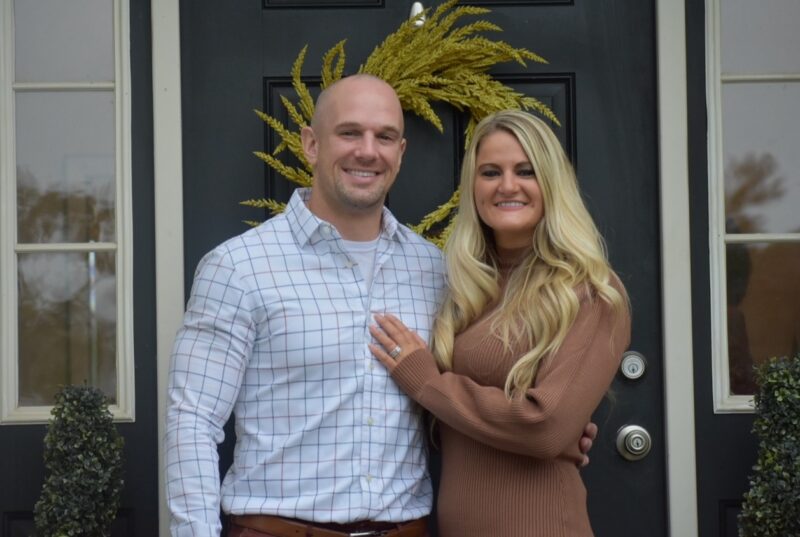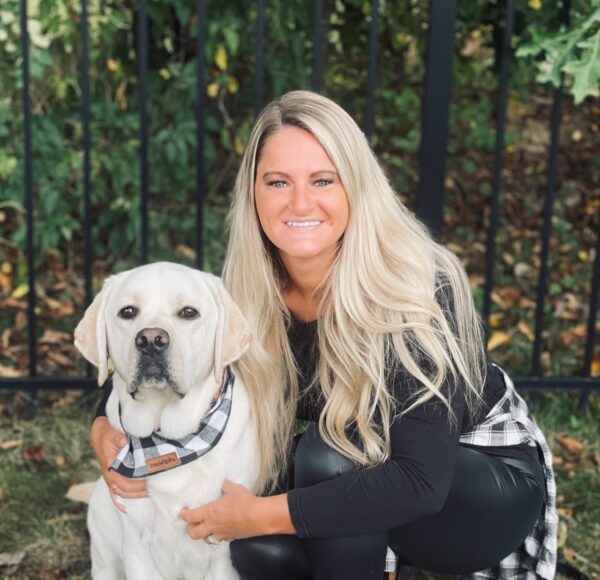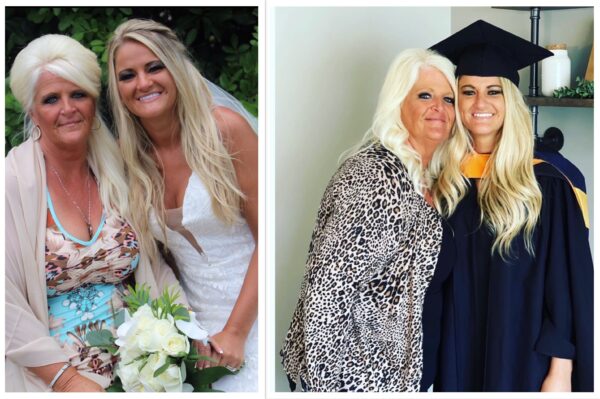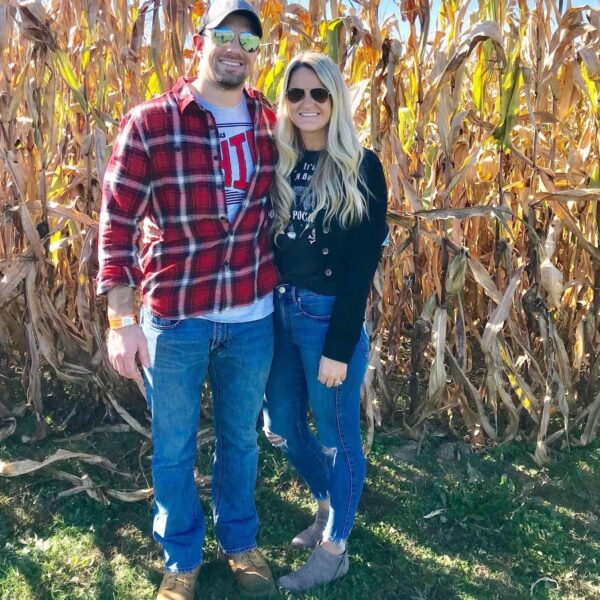
Clarissa Reed, pictured with her husband, Ian, is Akron Children’s newest critical care nurse practitioner in our Pediatric Intensive Care Unit.
CNP Clarissa Reed believes building rapport and trusting relationships are just as crucial as around-the-clock critical care in Akron Children’s Pediatric Intensive Care Unit (PICU). It allows patients, for even just a moment, to see a light at the end of the tunnel, she said.
That’s why amidst a hectic environment, Clarissa takes the time to check in with patients and families to get to know them personally, see how they’re coping and encourage them to be active members of the care team.
As Akron Children’s newest PICU critical care nurse practitioner, Clarissa’s goal is to continue to advance high-quality care with new ideas and innovations to improve recovery times and reduce mortality rates, all the while making a valuable and empathetic impression on patient families during a difficult time in their lives.
No doubt, the hardest part about Clarissa’s new role is caring for critically ill or severely injured kids. But true to her energetic personality, she takes the optimistic view and gets by each day focusing on the miracles and triumphs she often does see: the kids that do get better and get to go home to be kids again.
Why did you choose to come to Akron Children’s?
During middle school, my basketball team raised money shooting free-throws for Akron Children’s “Have a Heart, Do Your Part” radiothon. My entire basketball team and our families took the trip to the hospital to hand deliver the check for the money we raised. This was my first time there and I instantly fell in love with the vibrant culture. I vividly remember the experience, enthusiasm and, of course, the ball machine! Without question, I knew this hospital was a special place and I dreamed of working there one day!

When she’s not busy treating patients, Clarissa enjoys spending time with her dog, Toby.
Describe your role at Akron Children’s and what you hope to accomplish.
After 8 years of working as a registered nurse in the PICU, I decided to advance my career as a pediatric critical care nurse practitioner, my absolute dream job. I watched the NPs within our unit for quite some time, valuing their level of independence, decision making and overall skill sets.
What I hope to accomplish as a critical care nurse practitioner is to continue to improve the quality care we provide to our patients by bringing new ideas and innovations, while also making a valuable impression on each one of my patients and families during this difficult time in their lives. Our unit is consistently thriving to advance in order to provide the most optimal care to patients by improving recovery times, reducing morbidity and mortality, and providing all-encompassing care. Truly, our unit never settles for less.
What is your area of expertise and why did you choose it?
My area of expertise is pediatric critical care medicine, the most astounding field in my eyes. I’ll never forget my first day in the PICU here as a novice registered nurse: the sight of all the monitoring devices, IV medications and pumps, ventilators and chest tubes. This would be a frightening sight to most, but I instantly fell in love and knew I was exactly where I was meant to be.
I chose this area because I love the strategic thinking and science behind healing a critically ill or severely injured child. Each shift is always diverse, but with each child requiring advanced treatments and technology, consistent monitoring and care that goes beyond just medicine. I love being a part of a team that comes together across all disciplines with a common goal, to heal each child so they can get back to being a kid again.
What impression do you hope to leave with your patients each day?
When caring for the critically ill and their families, I hope to leave an impression of everlasting empathy and compassion. I want patients and their families to know I am there for them on their darkest days; that they are more than just a diagnosis or room number.
Building rapport and a trusting relationship is essential to the care of our patients. Among all the chaos, I try to take a step back and spend a few moments to see how patients are coping, get to know them personally and allow them to be active members of their care. I feel this allows our patients, for even just a moment, to see the light at the end of the tunnel. There is nothing more reassuring and heartening to make a child and their family laugh or smile, and it always makes my day.

Clarissa says her mom has always had the greatest influence on her. She is Clarissa’s biggest cheerleader and supporter.
What do you think is the hardest part of your job?
I often receive the same response when I tell others where I work: “I don’t know how you do it.” I admit, some days are extremely difficult. The hardest part of our job is when, despite critical care medicine and science, our options have run out and there is nothing left to heal that child.
I will never forget saying goodbye to my first patient in the PICU. I held back tears to remain strong for the child’s family, excusing myself quite frequently. Shortly after, one of our PICU Attendings explained to me it’s OK to cry with patients because it shows we are compassionate.
Losing a child is a complete tragedy and something we experience in the PICU that never gets easier. But, what gets us by are the miracles and triumphs we often do see: the kids that do get better and go home to be kids again.
What excites you most about medicine?
I love how medicine consistently evolves and improves so we can treat and heal patients quicker and reduce morbidity and mortality rates. Within the PICU, we focus on evidence-based practice research and bettering our quality outcomes. We are always adopting advanced technology and pathways in order to improve patient care.
What would you most like to change about health care today?
If I could change health care today, I would improve access to health care and reduce the cost of services. I would implement more funding to scientific research, specifically cancer research involving primary and secondary prevention, and successful treatment options.
What does success mean to you?
I find success each day in learning and growing from every passing shift. Success is not measured by how many patients you treated that day or how many procedures you performed, but rather the effort and compassion that was put into caring for each individual patient. I find success in leaving each shift knowing that I did everything in my power to heal a child or increase their comfort level.

Clarissa and Ian were recently married. They are excited to begin their life journey together.
Who had the greatest influence on you and why?
My mother, since day one, has always had the greatest influence on me. She is my biggest cheerleader and supporter. My mom taught me to push myself and never give up no matter how difficult things become. She consistently guides me in the right direction and has the largest, most caring heart. I strive to follow in her footsteps by putting others first and lending a hand when needed.
How do you unwind from a busy day?
Believe it or not, after a busy shift (following sleeping, of course!), I love cleaning my house. It’s a win-win!. There is just something about blaring music and grabbing the sweeper and going to town! I also have a big yellow Labrador Retriever named Toby that keeps me busy and entertained!
What’s your favorite holiday?
That’s an easy one, Christmas! I am the person who decorates her home for Christmas the day after Halloween. I love how this holiday brings family together, everyone is surrounded listening to Christmas music and eating good food! I love all the traditions this holiday holds.
What is your favorite vacation spot and why?
My favorite vacation spot will always be Hilton Head, S.C. We vacationed here often when I was a child. I have the fondest memories of my dad on this beach, learning to skimboard and Boogie Board.
What events in your life made you who you are today?
I lost my father 6 years ago when I was 24. He was unexpectedly diagnosed with stage 4 lung cancer and his battle was limited to 6 short months. Losing my dad so abruptly changed my entire outlook on life. I strive each day to make my father proud by trying to better myself and advance my career and education. You can never take life and those in it for granted. You can never tell someone too many times you love them.










